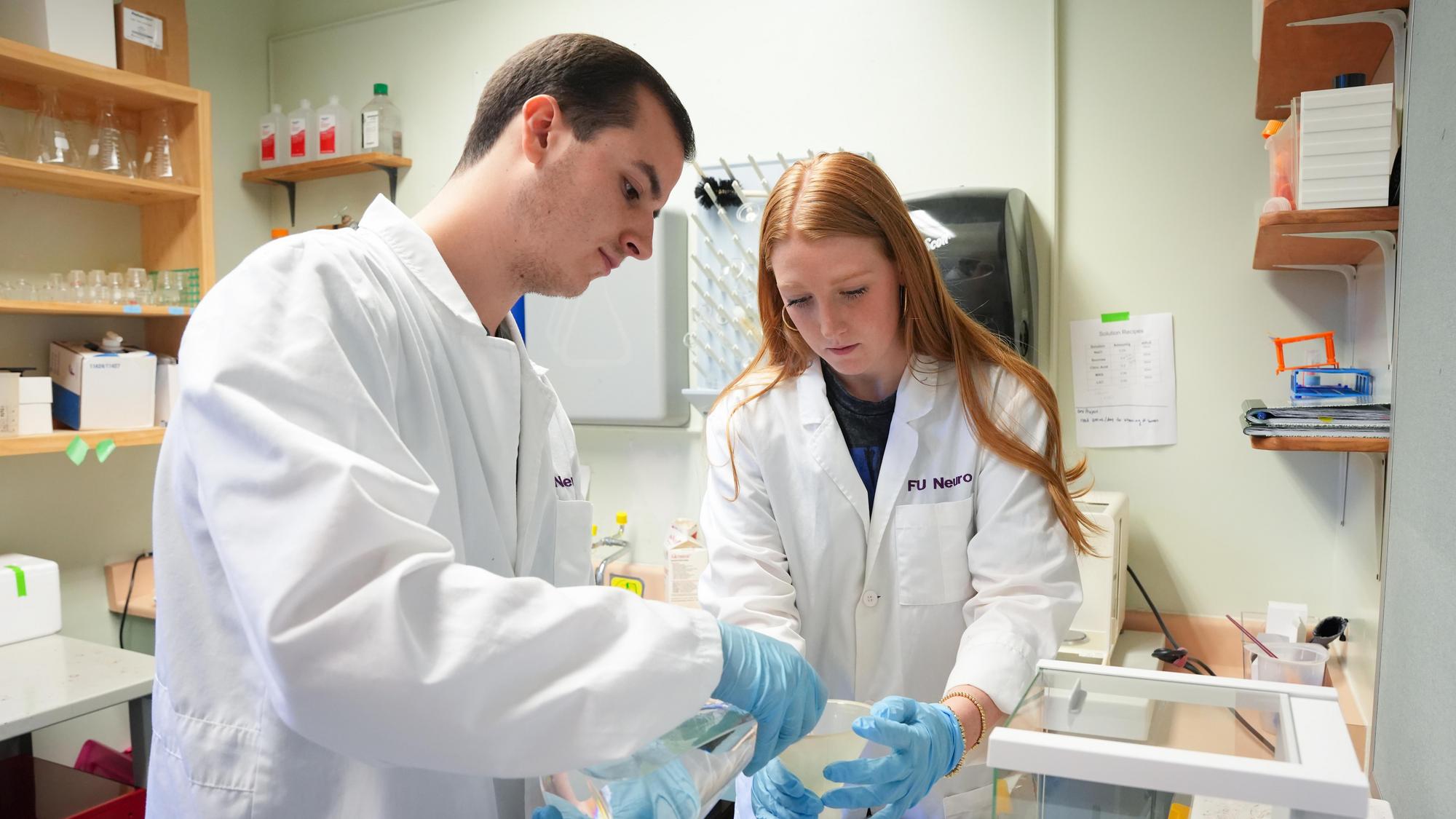Students explore groundbreaking potential for PTSD treatment

“I’m really interested in the brain,” said Christopher Petty ’24. “It’s one of the most confusing things, but everybody has one.”
That complexity and ubiquity helped lead the neuroscience major to the research overseen by Onarae Rice, a professor of psychology and neuroscience and chair of the neuroscience department. This summer, Petty is one of seven undergraduate research fellows working with Rice on his continuing research into post-traumatic stress disorder (PTSD).
They are homing in on dopamine receptors, proteins in the central nervous system that bind with molecules and set off chemical reactions. Their work this summer builds on Rice’s previous research into the D3 receptor, which, when activated, has been shown to contribute to the development of PTSD, Rice said.
Preventing PTSD?
With the approval and oversight of Furman’s Institutional Animal Care and Use Committee (IACUC), which ensures compliance with animal welfare rules and ethical principles, the researchers first expose laboratory mice to a single prolonged stress protocol designed to evoke behaviors similar to PTSD symptoms found in humans – particularly hypervigilance, characterized by “freezing and constantly looking around,” said Petty. They use the highly selective antagonist compounds SB277011A and YQA14 to target and block the D3 receptor and observe the effects.
So far, researchers have investigated many potential scenarios, said Rice. The D3 antagonist was shown to be effective in the animals that had already begun expressing PTSD-like symptoms. Petty and others have also focused on whether there is a window of time after a traumatic event happens – but before symptoms begin – in which a treatment can be effective.
And a third line of inquiry could have groundbreaking implications for populations like the military and first responders, Rice said.
“What if we gave them the D3 antagonist before they were on the scene of a traumatic event or before they went into war?” he asked. “This research would be the first in the world to show that we can actually prevent PTSD from developing.”
‘An amalgamation of disciplines’
The students’ work is “not just sitting on a bench and looking at molecules all day,” said Jonathan Wade ’24, a neuroscience major who hopes to enter medical school. It also requires designing and coding video-assisted machine-learning processes to characterize the movement patterns of the mice, as well as the biological components of working with the rodents.
“Neuroscience is an amalgamation of a lot of different disciplines that you’re having to apply all at once,” Wade said.
The dedication to high-impact learning experiences pledged in The Furman Advantage is demonstrated in the fact that students at all levels, from first-year to seniors, have the opportunity to work in the lab, said Rice.
“It’s rare for undergraduates to work on research at this level,” he said. “The experience that they’re getting is more like the experience I got in graduate school.”
Personal connections, professional development
The undergraduates enjoy a great deal of latitude and autonomy to follow their own scientific curiosity. Kirsten Folger ’25 and Caroline Romack ’25 have teamed up to specifically study gender differences, investigating how PTSD behaviors may present differently in female and male mice.
Folger, a neuroscience and philosophy double major, has both personal and professional interests.
“My brother is a paramedic,” said Folger, who intends to continue to pursue research in her future career as a neuropsychologist. “So I’m learning more about PTSD and being able to potentially help people. But this has also been the perfect opportunity to prepare me for grad school and what I’ll be doing in my future.”
“This research has meant a lot to me, because I have a lot of people in my life with PTSD,” added Petty, who plans to enter graduate school to study psychopharmacology. “The combination of learning more about a subject I love – the brain – and having the potential to help people that I love who are struggling with this thing makes this a great research fit for me.”